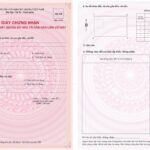Purchasing foreclosed properties from banks is becoming increasingly common. These homes are often sold at a discount compared to market prices as the owners are typically in financial distress and unable to service their loans.
However, buying foreclosed properties comes with its own set of risks. Firstly, as the property is mortgaged, the land use right certificate and related documents are usually held by the bank, making it difficult for prospective buyers to access accurate information about the land and the property.
Secondly, disputes among co-owners may arise, complicating the sales process. Additionally, transferring ownership can be time-consuming as it requires the consent of the mortgagee, which is the bank.

Buyers should exercise caution when purchasing foreclosed properties. (Illustrative image)
Hence, experts advise that a tripartite agreement between the seller (mortgagor), buyer, and bank (mortgagee) is necessary when engaging in such transactions. This agreement should outline the rights and obligations of each party regarding payment, breach of contract, and handling of the mortgaged asset.
To safeguard their interests, buyers should carefully review the terms of the agreement, ensuring they are specific and clear, with well-defined responsibilities and obligations for each party, including provisions for potential contingencies.
In addition to the tripartite agreement, when purchasing a mortgaged asset, the buyer should make the payment directly into the seller’s account at the bank. Subsequently, the buyer requests the bank to freeze the account.
Afterward, the mortgagor, mortgagee (bank), and the third-party buyer sign a tripartite agreement. The bank agrees to allow the sale of the mortgaged property and will only unfreeze the account once the property transfer process is complete.
Finally, the mortgagor removes the mortgage registration at the Land Registration Office upon obtaining the tripartite agreement.
In cases where the sale proceeds exceed the seller’s debt to the bank, the buyer pays the bank an amount equivalent to the principal and interest to settle the seller’s loan. The bank then releases the mortgage and returns the property ownership documents to the seller.
The seller and buyer then agree on the settlement of the remaining sale proceeds after deducting the amount paid to the bank.
Once the mortgage is removed, and the land use right certificate (red book) is retrieved, the parties proceed with the property sale notarization process as per regular procedures.
Experts caution that purchasing foreclosed properties involves higher risks and complexities compared to regular real estate transactions. Therefore, buyers should approach these deals with caution and conduct thorough due diligence.
“The ACB Chairman Seeks More Detailed Guidelines for the Implementation of the 2024 Land Law.”
The leaders of joint-stock commercial banks attribute the country’s economic growth and controlled inflation to the effective coordination between monetary and fiscal policies. This harmonious relationship has been pivotal in achieving macroeconomic stability and keeping inflation within the targeted range.
Sure, I can assist you with that.
### The Benefits of Upgrading to a New “Red Book”
Is the new “Red Book” a mandatory upgrade? Absolutely not! But here’s why you should consider it anyway.
The Land Use Rights Certificate, the Certificate of Ownership of Residential Housing and Land Use Rights, and the Certificate of Land Use Rights, Ownership of Housing and Other Assets Attached to the Land that were granted before January 1, 2025, remain legally valid and are not mandatory to be replaced with the new certificate template.













































